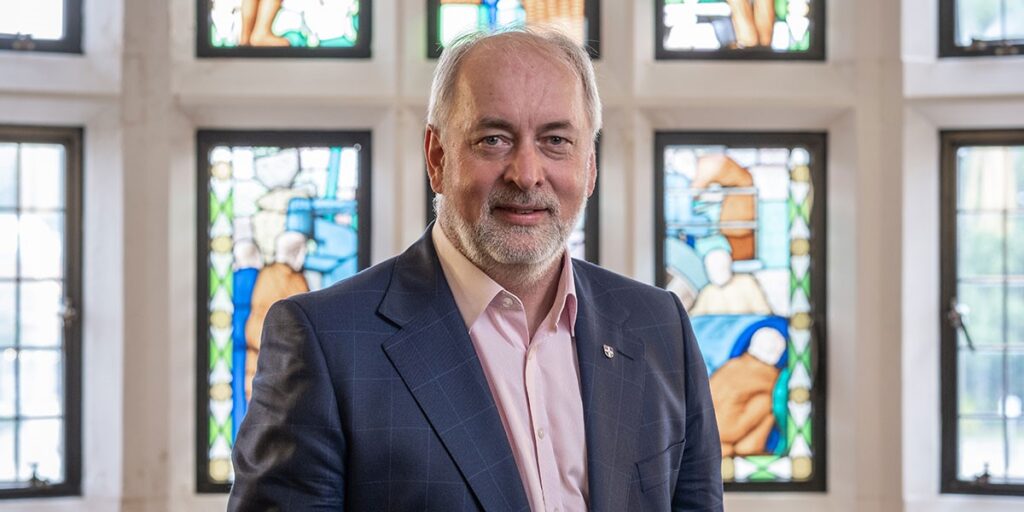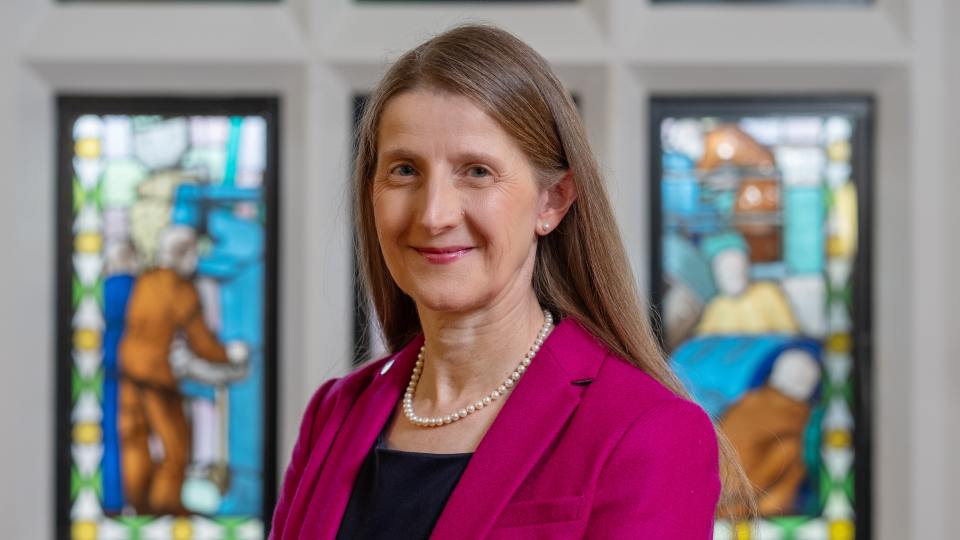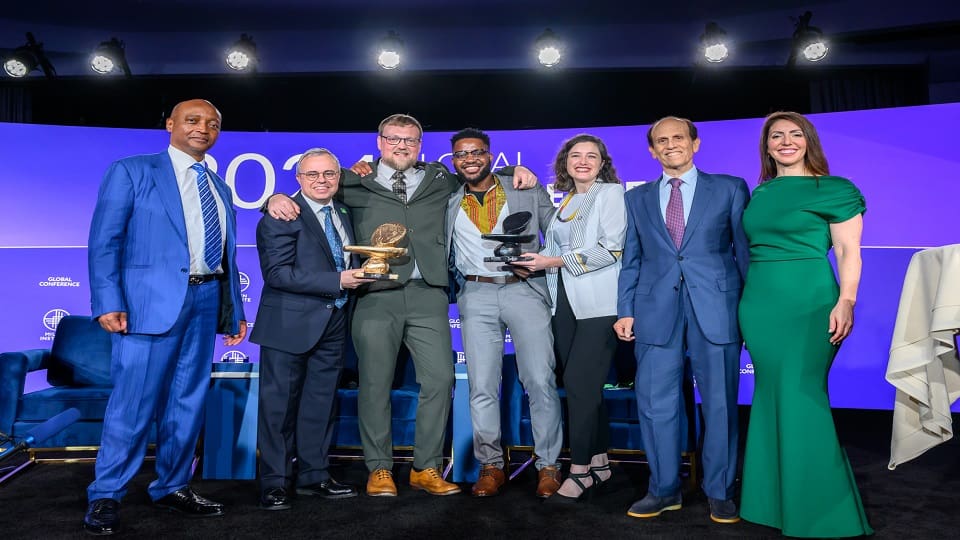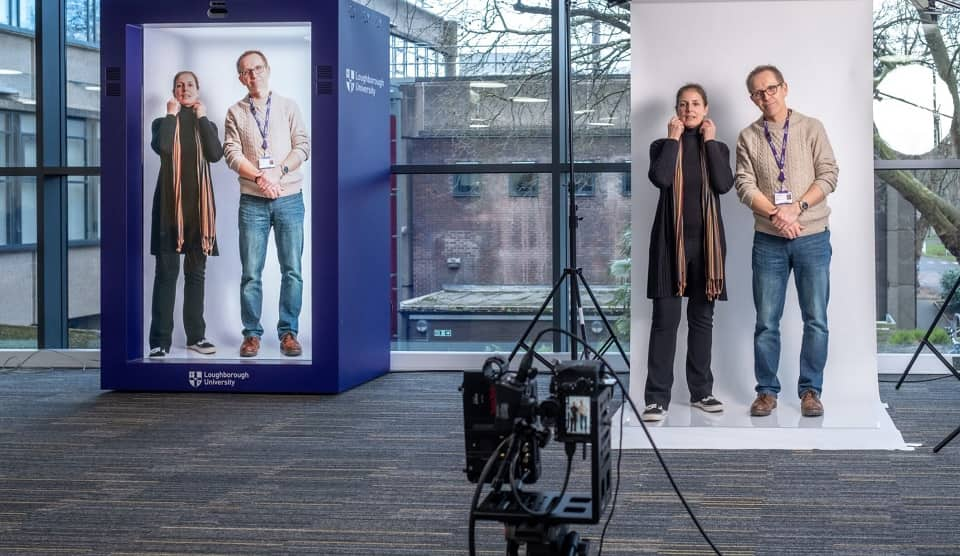From the Vice-Chancellor – May 2024

In my May newsletter: New Provost announced, global green prize for research project, a Code of Practice for the Freedom of Speech Act, next phase of the DigiLabs project, a new Loughborough-UCL partnership, and a successful weekend of sport.

New Provost and Deputy Vice-Chancellor appointed
After a highly competitive international search, we have appointed Professor Rachel Thomson FREng, our current Pro Vice-Chancellor for Education and Student Experience, as our next Provost and Deputy Vice-Chancellor. Rachel succeeds Professor Chris Linton, who has served three successful terms as Provost and will step down from the role at the end of this academic year.
Rachel has shown outstanding leadership throughout her career at the University and during her tenure as Pro Vice-Chancellor, the University has cemented its reputation for an outstanding student experience. Loughborough was awarded Gold overall and Gold for both Student Experience and Student Outcomes in the national Teaching Excellence Framework (TEF). She was the academic lead for a £50million investment in the University estate, including the development of STEMLab – our shared science and engineering teaching laboratories – and she is currently spearheading our new DigiLabs project, which you can read more about in my newsletter today.
Rachel is also an internationally recognised researcher in Materials Engineering, who has successfully supervised almost 50 doctoral researchers and secured more than £40million of external grant funding. In 2018 she was elected as a Fellow of the Royal Academy of Engineering and is currently a member of the Strategic Advisory Board for the Henry Royce Institute, the UK’s national institute for advanced materials research and innovation.
We are entering a critical period of our strategy implementation and with Rachel as one of the driving forces behind this, I am confident that the University will continue to succeed, notwithstanding the challenging external environment in which the higher education sector is currently operating.
We have now begun the process of recruiting to the Pro Vice-Chancellor for Education and Student Experience role and I’d anticipate being able to provide a further update on this in the autumn term.
I’m sure you’ll all join me in congratulating Professor Thomson on her appointment as Provost and Deputy Vice-Chancellor and in thanking Professor Linton for his many years of successful service in the role.

Aftrak project wins global green energy prize
I was delighted to hear this month that Aftrak – a Loughborough University led initiative that combines solar microgrids and tailored tractors to empower smallholder farmers across Africa – had overcome competition from four other international finalists to secure the prestigious $1million Milken Motsepe Prize in Green Energy prize.
The Aftrak project is a self-sustaining system made up of a solar microgrid, a micro electric tractor – both of which have been invented and manufactured at the University – and Deep Bed Farming, which more than doubles crop yield. The project involves a partnership of researchers from the University’s Centre for Renewable Energy Systems Technology, Tiyeni – a Malawian NGO (non-governmental organisation), and the Consortium for Battery Innovation. It has been supported by Innovate UK, and one of the world’s largest battery manufacturers, Varta by Clarios.
Following successful tests at Loughborough University and demonstrations at the Africa Green Economy Summit in South Africa, Aftrak is now being deployed in Malawi, where close to 90% are without access to electricity.
Projects such as this are hugely strategically important. Aftrak demonstrates how working in partnership on cutting edge research and innovation can bring tangible international engagement and impact, in line with our Climate Change and Net Zero theme.
My congratulations to all those at the University who are involved in the Aftrak project. I look forward to seeing how it develops further.
Freedom of Speech act due to be implemented
Academic freedom and freedom of speech are critical to driving forward research and innovation, and also provide students with the opportunity to think critically and engage with different perspectives. Universities’ responsibilities to protect and promote both freedom of speech and academic freedom have been strengthened by the Government’s Higher Education (Freedom of Speech) Act 2023, which became law last year and is due to come into effect from 1 August 2024.
In order to prepare, we have adopted a Freedom of Expression Code of Practice which codifies our commitment to securing and promoting freedom of expression within the law for our staff, students and external speakers. The Code of Practice is available on the Freedom of Expression webpages, where there is also a section on the right to protest. Please do make sure you take a look.
The new Code of Practice sits alongside our position on academic freedom and our commitment to driving forward Equity, Diversity and Inclusion (EDI) – both of which remain unchanged.
I know some will welcome the new Act as a critical element of a successful EDI approach through which individuals and groups are supported and able to express themselves freely. I recognise, however, that others may feel that the Act will mean some groups of society are more likely to be the subject of someone else’s controversial free expression. It is important to remember that hearing things we don’t like or agree with doesn’t necessarily make them unacceptable. However, I would reiterate that speech or expression which is a breach of the criminal or civil law – because it is harassment, discrimination or defamation, for example – is not acceptable in law or within our community.
Over the 2024/25 academic year we will be producing more guidance and support on the implementation of the Act and supporting staff and students in how we can disagree with one another without being disagreeable.

DigiLabs project enters its next exciting phase
Next month, thousands of prospective students will be welcomed to our University open days by a ‘virtual’ version of our Chancellor, Lord Sebastian Coe, who’s recorded a message for use on our new DigiLabs hologram technology.
The facilities we’re installing as part of the DigiLabs project will enable our students to develop the skills and knowledge to become future fit for the world of work where digital skills, data analytics, virtual and augmented reality play a key part, and ensure they can benefit from artificial intelligence and machine learning to support future technologies.
There will be four DigiLabs – focusing on Extended Reality Learning; 3D Data Capture and Visualisation; Robotics; and Simulation, Modelling and Artificial Intelligence – supported through three hubs. The first two hubs, in West Park Teaching Hub and the Leonard Dixon Theatre in Martin Hall, are due to be up and running early next academic year; the third hub in the Central Park area of campus, is due to be ready next year.
The cutting-edge technology will significantly enhance the learning experience for our students and I’m keen that it’s maximised by staff in Schools across the University. To begin facilitating this we have recently awarded five DigiLabs Teaching Innovation projects to staff who are pioneers in the use of the new technology for areas ranging from teaching human anatomy to the 3D visualisation of engineering and scientific structures. We’ve also employed student interns through the new TalentMatch Summer scheme to work with them on the projects.
We’re currently developing some guidance on how you can access and use the new technology in your teaching. For now, please have a look at our new website, and complete the form if you would like to join our new Special Interest Groups.
DigiLabs aligns firmly with our strategic aims to strengthen our sector-leading student experience through the use of the latest digital technologies, and could also contribute to our sustainability strategy as part of our Climate Change and Net Zero strategic theme by, for example, removing the need to fly in guest speakers and reducing the amount of materials used by students in building their prototype designs through prior 3D digital visualisation.
Loughborough and UCL join forces on new opportunities for local graduates
In 2022 University College London (UCL) opened its campus on Queen Elizabeth Olympic Park, joining Loughborough University London in one of the capital’s most dynamic districts. I was delighted, therefore, to announce this month that our two universities will be working in partnership to enable more people from East London to access our education.
The Inspiring Success initiative aims to encourage people to test drive the experience of studying at UCL or Loughborough University London, while also boosting their personal and professional development. We’ll be offering four workshops that will enable unemployed and underemployed local graduates to undertake career focused activities and gain an insight into what it’s like to study for a postgraduate degree at Loughborough University London or UCL East.
Participants will also learn about opportunities for local graduates to get involved in SHIFT – a catalyst organisation supporting innovators on and around the Park, of which Loughborough, UCL and the University of the Arts London are all founding members.
The partnership with UCL East is the latest initiative that’s enabling us to connect with the local talent pool and support communities in the region, both of which were key drivers for establishing our campus on Queen Elizabeth Olympic Park and firmly relate to our Vibrant and Inclusive Communities strategic theme.
We have also agreed, with Loughborough College, a community development partnership with London-based football club Hackney Wick to create a new football academy offering quality education and guidance to Hackney Wick’s emerging talented footballers. We are partnering with Hackney Council on research to inform the Council’s ambitions to build a fairer, greener local economy and a more environmentally sustainable borough. And we are now the official higher education partner of West Ham United Women – it’s the first partnership of its kind in the Barclays Women’s Super League (we started with the best football team!) and includes research, athlete education programmes and access to performance support expertise.

Athletics and Wheelchair Basketball mark successful sports weekend
The Loughborough International Athletics (LIA) meet has long been a key fixture in the athletics calendar and always has added significance in an Olympic and Paralympic year, often drawing high-profile names. This year Great Britain’s Katarina Johnson-Thompson made an appearance, underpinning her Paris 2024 medal hopes by recording a season’s best in the high jump at the Loughborough event.
Billed as the ‘Battle of the Nations’, the LIA sees Loughborough athletes take on competitors representing England, Wales, Scotland, GB&NI Under-20s and the National Athletics League for the annual competition. Loughborough’s points total by the end of the meet put the team second behind England, with our athletes delivering some truly standout performances, including Loughborough sports scholar and Tokyo Paralympic champion Ntando Mahlangu, who stormed to victory in the men’s para 400m with a personal best, and Poppy Malik, who won gold for Loughborough in the women’s 400m.
The night before the LIA, Loughborough Lightning’s Wheelchair Basketball side had won their third consecutive title to continue the team’s dominance in the Women’s Premier League.
The team had been unbeaten throughout the whole campaign and their 73-44 play-off final victory over East London Phoenix confirmed their place in the history books. Lightning remains the only team to take the championship crown since the league’s inception in 2021, which is a phenomenal achievement.
These are perfect illustrations of success against our Sporting Excellence and Opportunity strategic aim. I look forward to further sporting achievements over the summer, as our athletes head off to the Paris 2024 Olympic and Paralympic Games!
Vice-Chancellor's Communications
Opinions and comment from the Vice-Chancellor, Professor Nick Jennings

